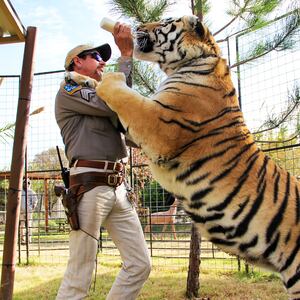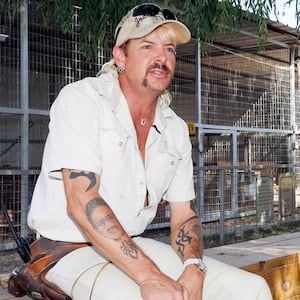John Cameron Mitchell may be one of the few among us who was not infatuated with the Netflix docuseries Tiger King and its circus tent of outlandish characters. Is infatuated the right word? Baffled by? Repulsed? Regretfully entertained?
At the very least, “entranced” might be the best way to describe our collective relationship to Carole Baskin and Joe Exotic, the gregarious rival Big Cat enthusiasts at the center of a real-life redneck soap opera involving queer throuples, leopard print ensembles, and country music—oh my!—that unfolded before a rapt global audience at the beginning of the pandemic in March 2020.
So it might come as a surprise that two years later, Mitchell is playing one of the titular roles in Joe vs. Carole, starring as the inimitable Joe Exotic opposite Kate McKinnon’s Carole Baskin.
Peacock’s limited scripted series sets out to recontextualize the lightning-rod sensationalism of the Tiger King docuseries that led to its months-long tenure as the leading reference point for pop culture jokes, but also the staunch criticism for the way the series’ subjects were exploited as poverty tourism and crass entertainment.
For Mitchell, a creator-performer known for playing in the liminal art space where truth and humanity meet mischievous provocation—the first production of his rock musical Hedwig and the Angry Inch was in 1998, while his groundbreaking indie film Shortbus just celebrated its 15th anniversary—that reconsideration of who these people were and what our fascination with them said about us was the appeal of, finally, entrenching himself in Tiger King Land.
“I started watching a little and I’m like, ‘Oh, this is gonna be roadkill, and we’re all rubberneckers,” Mitchell tells The Daily Beast on a recent Zoom call. “The way it was presented, it was kind of empathy-free, which is the classic American Real Housewives way to look at real people.”
In many ways, Tiger King made global stars out of Joe Exotic and Carole Baskin by rendering them as cruel punchlines. Joe vs. Carole subverts that, not so much as redemption, but for, at the very least, some understanding. Says actor Kyle MacLachlan, who plays Carole’s husband, Howard Baskin, “There’s a greater story to tell here about the motivations that actually get these people to the point that we first met them in the documentary, and that’s what our story is about.”
Should you, like Mitchell circa spring 2020, be one of the blessed few who had no idea why everyone in your life was constantly saying “hey, all you cool cats and kittens,” here’s the best attempt at an impossible task: a brief primer on an unbelievable story.
Joseph Schreibvogel Maldonado-Passage—aka “Joe Exotic”—is a polygamist, gay, country-singing, zoo-owning, former presidential candidate and murder-for-hire felon with a bleached blond mullet. For two decades, he made a living breeding tiger cubs and running a dilapidated zoo showcasing dozens of big cats in rural Oklahoma.
He had a peacock’s showmanship—regal feathers swapped for a handlebar mustache and cowboy hat—and a mother hen’s welcoming nature. He collected a series of misfits and loners to work for him at his zoo, at one point convincing two wayward “straight” young men to both be his husbands.
As Mitchell says, “He became a bit of an anti-folk hero to some because of his unapologetic, anti-authoritarian, ‘I’m making my own way’ thing. The fact that he was queer made him even more of an iconoclast. It was kind of surprising that the rednecks rallied to his defense.”
Thousands of miles away, Carole Baskin ran a wildlife sanctuary in Florida, but her interests extended far beyond the fences of her own Big Cat pens. She targeted and wanted to ruin exotic animal owners she believed were abusing or exploiting their charges, at one point setting her eyes on Joe Exotic. What began as a turf war between them exploded into a mess involving multimillion-dollar legal battles; videos, websites, and, yes, even a country song attacking each other; and, most infamously, Exotic attempting to take a hit on Baskin’s life, landing him in jail, where he continues to reside.
(Implausibly, that’s not the most elicit murder plot in Tiger King, which spends copious time litigating never-proven rumors that Baskin had her late first husband killed and covered it up by feeding his body to tigers.)
All of this culminated in a series that painted Exotic as a megalomaniac responsible for his own downfall, like a certain kind of wish-fulfillment for a redneck Donald Trump, and Baskin as a vengeful shrew offered up to culture’s worst impulses toward misogyny—as if to be fed to the tigers of sexism herself.
If there’s a point to revisiting all of this two years later, it’s to sift through the elements that were so larger than life as to create mass hysteria and, as MacLachlan says, “balance that with truth and reality that these things are coming out of a place of great pain, hardship, and trauma, and that’s why they’re larger than life.”
The episodes, created by Etan Frankel, include flashbacks to Baskin and Exotic’s lives in the decades before the events of Tiger King. You learn more about Joe’s coming out story and the loss he weathered on his way to become a blustering public figure. Baskins’ abusive past relationships are covered, as well as the remarkable way she pulled herself up as a businesswoman.
“We’re seeing Joe, a product of his environment, a product of homophobia of abuse,” Mitchell says. “We’re seeing the misogyny Carole had to deal with. They’re two admirable characters in that they’ve created their own worlds and said, ‘No one’s gonna mess with us.’ But the other side of that is you see enemies everywhere. They locked eyes and fought and kind of destroyed each other. Her reputation was destroyed. And his life was destroyed.”
He compares the saga to a Southern Gothic play that “Tennessee Williams could have written.” The salacious Tiger King moments are revisited, including Exotic’s eyebrow-raising throuple. But there is also a tender backstory detailing his long relationship with the first love of his life, and what it meant for them to be a gay couple in the South during the AIDS crisis. “It’s delicious to play, but I wouldn’t have wanted to do it if it was just a camp fest. If we didn’t get to know them. If we didn’t get to see his husband of 17 years who died of AIDS. If we didn’t get to see his suicide attempt and his boyhood,” Mitchell says. “That’s what attracted me most.”
There are people who have compared Joe Exotic to Donald Trump, surmising that Exotic’s notoriety as Tiger King aired mirrored the loyalty and support for his MAGA ideals. But in the end, Mitchell discovered some decidedly more complex avatars for Joe that might explain why so many people were transfixed by him–including, it turns out, Mitchell himself.
“There’s something admirable, especially to Americans, about someone who’s made it while saying ‘fuck you’ to the world and to authority and, you know, bullshit. But the other side of that is, of course, megalomania. People talked about Trump like, ‘I like that he says what he means.’ He doesn’t know what the hell he’s saying. He’s just talking. Authenticity, even fake authenticity like Trump, is worshiped in this country, to the deficit of morality even.”
It turns out that Mitchell and Exotic grew up in the same part of the country. They’re similar in age, and both lived through the AIDS crisis. But Mitchell was also struck by how much Exotic has in common with his other most famous character, Hedwig.
“They’re both a self-made, blond-headed person who is a showperson, who survived abuse, homophobia, and just a messed-up world,” he says. “And triumphed in one way as a performer but ultimately has a tragic flaw because they’re paranoid, identify as victims, and they have an enemy. That almost destroys Hedwig, but she breaks herself out of that cycle. Joe doesn’t, and he destroys himself.”








